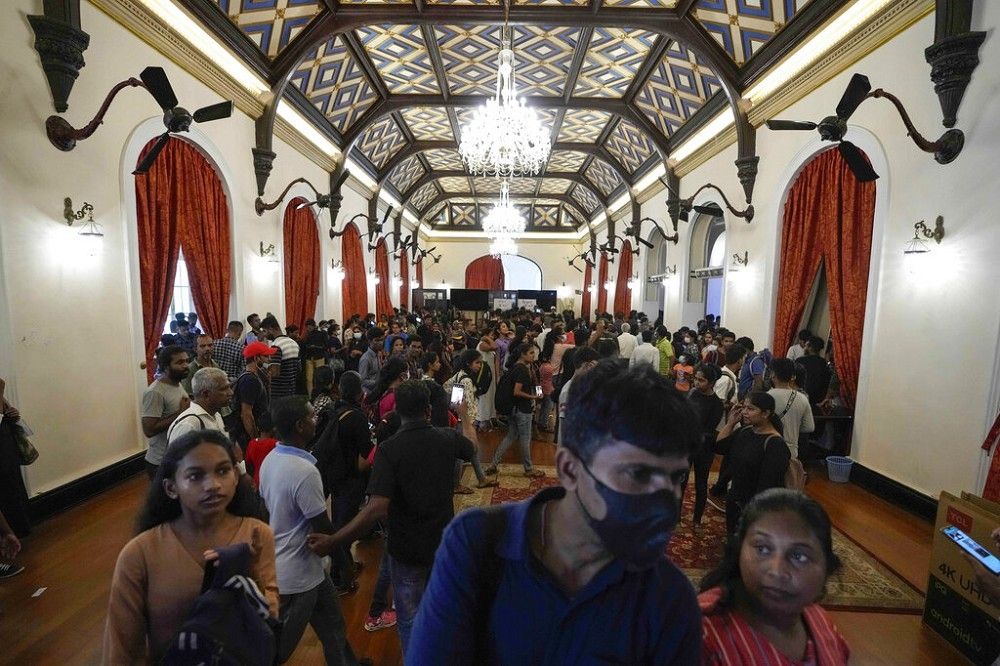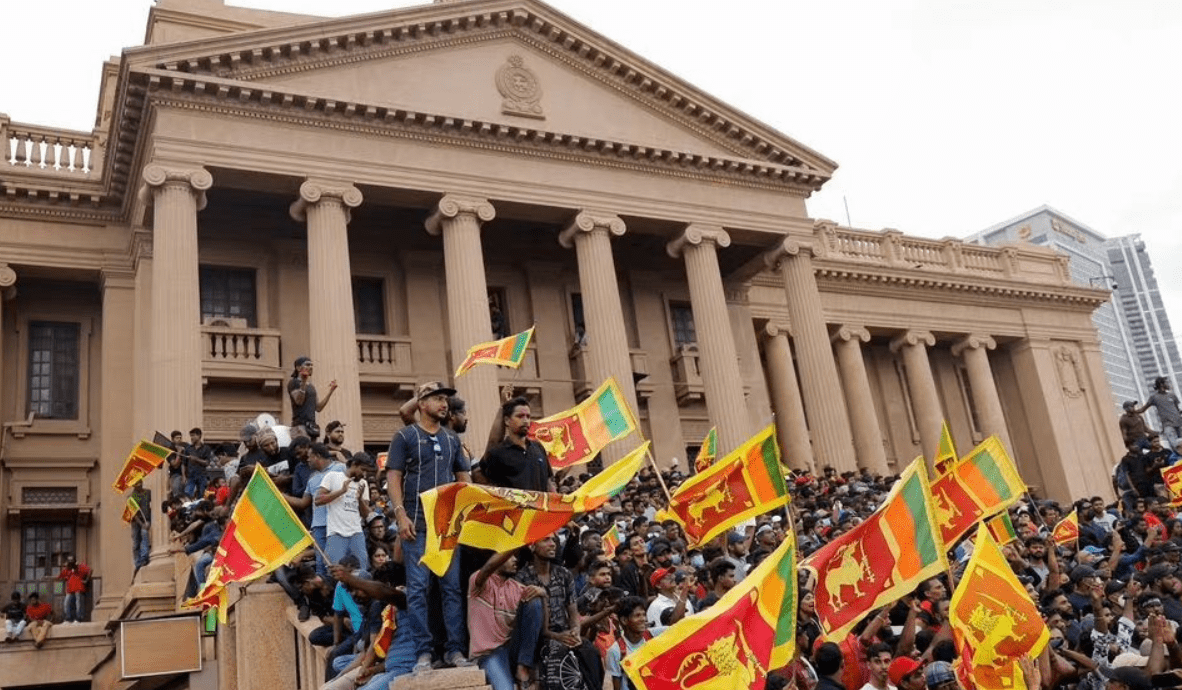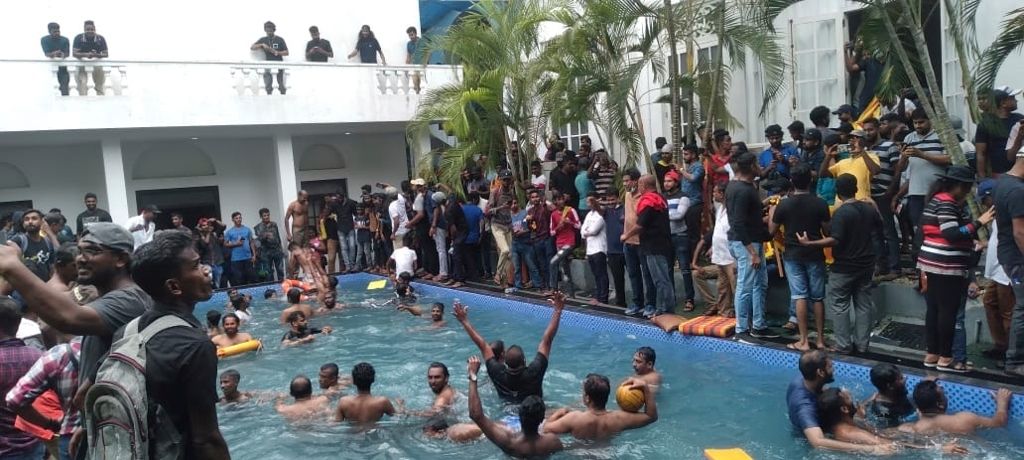
Sri Lanka's thorny road
Sri Lanka, a beautiful island located in the southeast of the South Asian subcontinent, was famous for its charming black tea aroma and warm Nanyang folk customs in the past. Now it has once again jumped into the international news headlines, but it is because of the bankruptcy of the country, the flight of the president, etc. event. Various seemingly magical and realistic events are rampant, and the originally peaceful Indian Ocean island ushered in the biggest crisis since the independence of the country in July 2022.

One wrong step, one wrong step on the road to bankruptcy
civil war
As for why Sri Lanka has come this far? The family of causes is not as complicated as it is to be prepared, and it is not a sudden change, but a gradual process, and the problem structure is intertwined. Looking further, the cause of the civil war can be traced back to Sri Lanka's racial problems since colonial times. In order to manage the colony more conveniently, the British, who were colonists at that time, adopted a policy of ethnic differentiation. By provoking the majority Sinhalese and the minority Tamil, the Sri Lankan people hated and opposed each other. The colonial mother country only needed to One of them, if you give some benefits and put some benefits, can trigger fierce slaughter, so that you don't have to spend more effort on rectifying the colonial people. However, with the end of colonization, the British took away their guns and pride, but not only left behind afternoon tea and suits, but also buried the ethnic problems brought about by colonization in the soil of Sri Lanka, and the seeds of hatred gradually Growing into a giant tree, the shadow of ethnic conflict hangs over Sri Lanka. After independence from colonialism, the discrimination in the education system made it much more difficult for the minority Tamils to get into a good university than the Sinhalese, and the government openly suppressed religious activities and media in the Tamil region, etc... The Mir people lost the opportunity to compete fairly with others, and all kinds of unequal consequences eventually erupted into the Sri Lankan civil war that began on July 23, 1983.
The two sides of the civil war were the Sri Lankan government army representing the Sinhalese and the Tamil Tigers representing the Tamils. The Tanmir hoped to establish a Tamil nation, revive its own politics, religion and culture, and liberate the oppressed compatriots. By constantly sieging cities and looting, challenging the Sri Lankan government, the LTTE often resorted to extreme violence, gradually expanding the Tamils' life through massacres, ethnic cleansing and riots, while the government gave the LTTE air strikes and cut off. Supplies and financial aid are trying to compress the mental and physical living space of the Tamils; in the past 40 years, nearly 100,000 Sri Lankans lost their lives due to the civil war, compared with those taken away by bullets and shells. Life, the increasingly serious problem is reflected in the fact that the racial rivalry did not end with the extermination of the leaders of the LTTE by government forces. The social atmosphere of opposition and polarization has become increasingly fermented since the government announced the end of the civil war in 2009, and it has become an unavoidable problem in Sri Lankan society today. Sri Lanka is a country that is highly dependent on the tourism industry, and a large part of the country's income comes from the contribution of tourists. However, because the racial issue has not been completely resolved, there is nowhere to vent dissatisfaction, resulting in bomb attacks in Sri Lanka. Forbidden to travel to Sri Lanka.
loan
The health of the colonial-style economic structure is already in doubt. In addition, the successive governments of Sri Lanka did not have a prudent fiscal policy: they either issued bonds extensively or borrowed from foreign countries. All have to repay the interest that has reached the upper limit of capacity, not to mention the severe test of the epidemic. Although Sri Lanka's borrowing from other countries is no longer a big news; however, in recent years, the amount of borrowing and the ability to repay are not directly proportional to the impact of the epidemic. If the domestic economic growth can keep up with the speed of foreign debt borrowing, it may not pose a problem. It is precisely because Sri Lanka's industrial output has experienced a fault in recent years, and its foreign exchange reserves cannot keep up with the speed of foreign debt borrowing, which has led to Sri Lanka's economic system becoming more fragile. Sri Lanka is highly dependent on China and India. Even when the debt problem is foreseeable in early 2022, based on political interests, instead of seeking help from the International Monetary Fund, it will turn to China for assistance. Of course, China is also happy to seek help from Sri Lanka. In 2017, Sri Lanka leased the southern deep-water port of Hambantota to China for 99 years to cover the fiscal deficit. In this series of failed borrowing policies, in addition to repaying sky-high interest rates, Sri Lanka has further lost some national interests (Eg ports, territories) due to insufficient repayment ability.
wrong policy
In 2009, the Sri Lankan government successfully wiped out the rebels, and the 40-year Sri Lankan civil war finally came to an end. Sri Lanka has been based on agriculture and tourism for many years. However, affected by the epidemic and extreme weather, the industry that Sri Lanka was proud of has gradually declined. Due to the epidemic, Sri Lanka has adopted a policy of blocking its borders since 2020, which has led to bleak business in the tourism industry. The output value of the tourism industry alone has shrunk by nearly 9 billion US dollars in just one year. At the same time, subject to the border blockade policy, people are afraid Missing the border opening period will make them unable to return to the country, making the working population who originally worked abroad and remitted money back home in a hurry to return to the country. This policy also directly caused Sri Lanka to lose two major sources of income and severely hit the Sri Lankan economy. In terms of agriculture, Sri Lanka, under the leadership of its leaders, chose to expand its small domestic market instead of the most profitable "foreign market" in the primary industry. The annual income standard of Sri Lankan nationals is there, even if the product quality is improved, The expansion of domestic demand is also limited to a certain extent, or even said to be not much larger than the original. In 2021, the Sri Lankan government began to ban the import of chemical fertilizers, advocated organic cultivation, and hoped to keep up with the world trend; I never thought that such a policy is too ideal, and it is an action taken to serve the mainstream values of the West, and it lacks practical implementation. Careful consideration has led to dissatisfaction among many farmers. The nutrition of farmland is limited, and the consequence of not applying fertilizer is a decline in production capacity. This policy was slowly loosened after the protests of many farmers. In this way, Sri Lanka missed its independence and succeeded in pacifying the best golden take-off period in just a few short years after the civil war. The subsequent series of erroneous lending policies of the government further pushed Sri Lanka into the abyss of bankruptcy.
bankruptcy, orgy
Beginning in early April this year, Sri Lanka officially announced that it was unable to repay its foreign debts. In May, the trigger conditions for debt default were met. Therefore, the trust level of Sri Lanka’s fiat currency in the international market fell rapidly, making it difficult for Sri Lanka to borrow in the international market, which in turn affected national and international relations. Confidence in Sri Lanka's currency, the decrease in confidence also means the currency will depreciate and the purchasing power will decrease. Sri Lanka also happens to be a country that is quite reliant on imported resources. The aforementioned currency inflation problem makes Sri Lanka unable to afford some imported goods, and some normal household goods have become scarce products, and the prices are unreasonably high. Only in April 2022, Sri Lanka's price inflation has reached a near-crazy situation, and a few commodities have even risen by about 50% compared with the same period last year. On the premise that wages have not been increased, prices have continued to rise. , which is bound to arouse public resentment. The lack of foreign exchange reserves and the decrease in the purchasing power of fiat currency make it impossible for Sri Lanka to buy vegetables, fruits, gasoline and other civilian materials from foreign countries. People were working but could not get the wages they deserved. The sound of demonstrations and protests, accompanied by traffic jams and shortages of supplies, gradually spread from the capital Colombo to surrounding cities; in the end, the demonstrators broke through in the middle of the night on 7/12. The siege, surrounded and restless outside the official residence of President Rajapaksa, made Rajapaksa have to agree to step down and fled Sri Lanka by plane at night; Prime Minister Ranil Wickramasinghe succeeded as acting president after the president escaped . He immediately declared a state of emergency across the country and imposed a curfew in the western provinces, trying to ease the conflict between the government and the people through peaceful dialogue; however, tens of thousands of people broke into the presidential residence and demanded his resignation. After stepping into the luxurious presidential mansion that they may not be able to reach in their entire lives, they began to play on the turf recklessly, and even jumped into the swimming pool to relieve the heat of July. During their first visit, they happily said that this was "the happiest day of my life". The scene of everyone playing and laughing in the official residence is in stark contrast to the hot mood half a day ago. For a moment, people really forget the problems of bankruptcy and foreign debts. Perhaps facing the depression brought by life and money, there is nowhere to release them. The people partying in the mansion reveled to the point that it looked as if they had really gotten rich overnight.


The carnival is over, then what?
No matter how frenzied it is, it will eventually calm down. The riots in Sri Lanka have stabilized with the suppression of the superior police force, and the people entrenched in the official residence will eventually disperse. Sri Lanka has only become more chaotic after that, and it has not improved the original debt problem at all. In fact, the international community has begun to study how to help Sri Lanka get out of the current quagmire. The feasible way is to restructure the debt plan with all creditors through negotiations. The Sri Lankan government owes a total of more than 51 billion US dollars in foreign debt, which needs to be negotiated. In the future, the principal and interest will be repaid at an annual price of 7 billion US dollars. Although this seems to be an impossible task in the short term, G7 members have promised to help Sri Lanka's debt crisis. The World Bank is currently willing to provide Sri Lanka. China has a quota of $600 million, and India has also pledged $1.9 billion. As for the International Monetary Fund, which was unable to cooperate with Sri Lanka due to political issues, it has always been the most powerful helper for Sri Lanka to get rid of the foreign debt problem. They have not only begun to discuss a loan plan of 3 billion US dollars, but also actively wait for the new government to take office. Prices will be revised, policies will be revised, annual income will be raised and then taxes will be gradually raised. I hope that Sri Lanka will return to a healthy and safe economic state so that Sri Lanka can repay its long-term accumulated debts in a normal way. As for China, which occupies the most important position in the composition of Sri Lanka's foreign debt, it maintains an ambiguous attitude towards the problems that Sri Lanka has encountered recently. Sri Lanka finally chose to seek assistance from the International Monetary Fund, which violated the contract signed between China and Sri Lanka. It is not interested in any form of debt restructuring. Beijing hopes to use its own economic capabilities to help Colombo get through this debt problem. Although China has some criticisms about Sri Lanka’s turn to international organizations, in view of its own domestic political and economic situation, China Nor does it object to Sri Lanka joining forces with an organization to properly handle its debts.
Like my work?
Don't forget to support or like, so I know you are with me..
Comment…